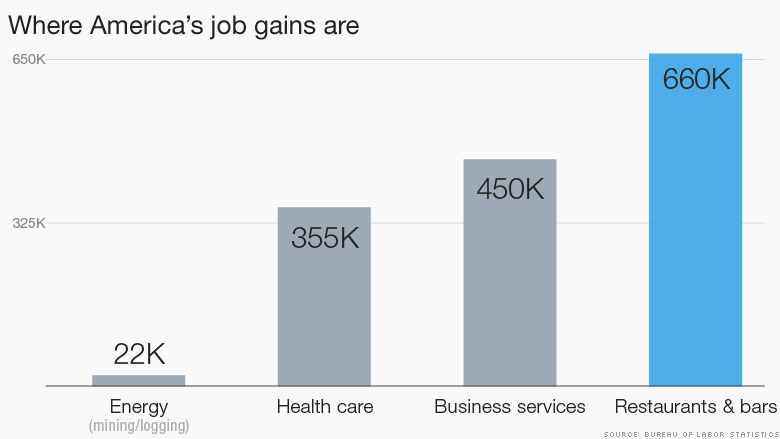
Getting a job in America is a lot easier now.
The economy has added nearly 3.3 million jobs in the past year. In February alone, 295,000 jobs were created -- beating expectations soundly.
And it gets even better: the U.S. has been adding jobs in many industries -- another sign that things are moving in the right direction.
If you're looking for employment, it's helpful to think about what fields are growing and where the highest wages are.
In the past year, retail, health care and service jobs such as lawyers and accountants saw the most job growth. On the downside, employment in the energy sector is slowing down after years of gains.
Here's a rundown of what could happen in 2015:
Related: 12 jobs with big paychecks
Foodie boom: The kale, quinoa and craft beer craze might explain why restaurants and bars are big job drivers. The food sector added 59,000 jobs in February, and it's gained almost 450,000 jobs in just the past 12 months.
But it's no secret waiters and waitresses earn low wages and rely on tips. Although the job growth is good, it exemplifies one of the job market's biggest problems: the quality of new jobs. Workers earning low wages can't spend much.
Despite that warning flag, one promising sign for high-quality job growth is your local tax man.
Share your story: Are you a part-time worker?
The service economy: Accountants may not be supermodels, but they are illustrating an important shift for America's economy. Businesses such as law, engineering and accounting are now the big drivers of growth, reinforcing the narrative that the U.S. is a service economy and no longer a manufacturing one.
The country added over 700,000 service jobs last year, and continued that tear in February, notching another 51,000 new positions. These are mostly well-paid jobs that are expanding in numbers quickly. Look for the service sector to play an increasing role in the identity and progress of the country's economy.

Related: The 100 best jobs in America
Health care: Love or hate Obamacare, lots of new jobs are arriving at hospitals and health centers across the country. Since Obamacare became law in March 2010, health care has gained about 1.2 million jobs. The industry is helping to drive U.S. job growth.
But there's a catch to Obamacare: while it's spurring new health jobs, it's also causing companies to cut back hours on their part-time employees.
A new provision of the law that began in January stipulates that companies must offer health insurance to employees working 30 hours or more a week. Big box stores like Walmart (WMT) and Home Depot (HD) are reducing hours for part-time employees to less than 30 a week, most likely to avoid health care costs.
The number of part-time workers who want full-time jobs is still 40% higher now than when the recession began in December 2007.
Still, health care's job growth is an overall positive for the economy.
Related: 'House of Cards':Why Frank Underwood's economic plan is crazy
Energy: Where it isn't going so well is the energy sector. Most Americans love that a gallon of gas costs about a dollar less now than a year ago, but that cheap gas is also costing the country some jobs, at least in certain fields.
Falling gas prices are forcing energy companies to cut back on high-paying jobs. This negatively impacts many Midwest towns whose businesses -- from home building to new schools -- rely on the oil business. The cheap gas that many Americans benefit from hurts the employment picture in these towns.
Energy jobs tumbled for the second straight month in February. Although the drop was modest, it's a concerning sign since they drove a lot of economic activity in the Midwest the past few years.
The U.S. economy already has a lack of new jobs that offer high wages. The slowdown in good gas jobs reinforces concerns that America has a quality of jobs problem.
The good news: if energy employment continues to fall, other industries that benefit from cheap gas such as manufacturing and trnasportation might pick up the slack.


